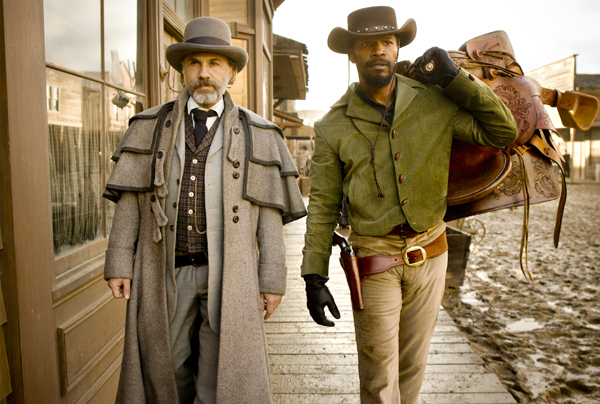
![]() A filmmakers love for his art can be infectiousweve seen it for a good 40 years from Martin Scorseseand theres no working filmmaker I can think of who, more often than not, infects his audience with that same love and admiration of movies as Quentin Tarantino. Looking back at his body of work, theres barely nothing I dont think is not only good but phenomenal. This is a personal preference, sure, and certainly everyone and their mother (or grandmother) has their thoughts on Pulp Fiction, Inglourious Basterds, and even the lesser-known but likable short The Man from Hollywood from Four Rooms. Now we come to the full-blown spaghetti western (a la Sergio Leone, Sergio Corbucci) or, scuese me, the Southern as Tarantino has called Django Unchained. How does it live up to his past works? On first viewingsmashingly well.
A filmmakers love for his art can be infectiousweve seen it for a good 40 years from Martin Scorseseand theres no working filmmaker I can think of who, more often than not, infects his audience with that same love and admiration of movies as Quentin Tarantino. Looking back at his body of work, theres barely nothing I dont think is not only good but phenomenal. This is a personal preference, sure, and certainly everyone and their mother (or grandmother) has their thoughts on Pulp Fiction, Inglourious Basterds, and even the lesser-known but likable short The Man from Hollywood from Four Rooms. Now we come to the full-blown spaghetti western (a la Sergio Leone, Sergio Corbucci) or, scuese me, the Southern as Tarantino has called Django Unchained. How does it live up to his past works? On first viewingsmashingly well.
When Jamie Foxxs Django is plucked out by European dentist Dr. King Schultz (Christoph Waltz), he is disheveled and shaking after walking for days chained with other slaves. He is bought by Waltz from his owners for a simple reason: Schultz is a bounty hunter, and Django knows what the three Brittle brothers, his prey, look like. In exchange for helping him find the fugitivesdead or aliveSchultz will set Django free.
They find the men on a plantation in a sequence that is classic Tarantino, full of absurd humor, with a particular flamboyant and foppishly attired Django, and horror seen in flashbacks of slave whippings and torture. The comeuppance is brutal. (Don Johnson is the wry plantation owner Big Daddy.) A sort of mentor/pupil/friendship then develops between King and Django. But training isnt allDjango wants to track down his wife, Broomhilda (Kerry Washington), enslaved somewhere in Mississippi. Cue the second half of the film.
I was slightly (though only slightly) concerned about a few particulars, mostly to do with Tarantinos collaborators. Sally Menke, his longtime editor, passed away in 2010, and this would be his first film without her; ditto producer Lawrence Bender (what happened there, who knows?); as well as the reports over the summer of various actors leaving the film due to the ol scheduling conflict or just walking off completely (Anthony LaPaglia, who Tarantino replaced with himself to play a bad guy late in the film). Was this production, his longest at 165 minutes, troubled?
From what I can tell, its still in the same glorious vein of this writer/directors other movies. In fact hes more ambitious. For once, or maybe since Jackie Brown, his hero is someone who doesnt have a gift or special skill prior to the start of the story. Django, though instinctively a noble and smart guy, needs some basic education (he learns to read from wanted posters), and he picks up Dr. Schultzs lessons very quickly. The plot really becomes a mythic story for this character, comparable to Siegfried in classic German folklore. Djangos wife was named for the Germanic warrior/goddess Brunhilda, whose her tale is recounted in a very niceyes, nicescene between Django and Schultz by a camp fire at night.
I loved seeing his journey from start to finish, especially when he arrives at the plantation Candieland, where we meet DiCaprios Calvin Candie and the film becomes another suspense masterpiece, like the sections of Basterds that are most fondly remembered. Django has to be very careful, as well as Schultz, in buying Broomhilda from the proprietary Candie, and these scenes become deeper than just being fun: theyre menacing and intense.
Foxx has never been better, and I have never (and you may have not either) seen DiCaprio play such a villain before, one so used to his own brutality. With his pointy bearded devil chin and cigarette holder, Candies a classic villain for any movie, but hes so much more sadistic due to his time and place as a fourth or fifth generation plantation owner raised by slaves who loves to see them brutally beat the crap out of each other and here and there (be warned) eaten by dogs. Standing behind Candie is Sam Jacksons Stephen. You almost forget how perfect, in every line spoken and step taken, he has been in all of Tarantinos films, but here hes something else. Who do you hate more, the slave master or the slave that becomes a sort of master of the house? Jackson plays Stephen as a very old man, yet one with a razor-sharp mind, who senses everything, and we fear him even more than Candie, that is until Candie pulls out a certain skull from a box. But I say too much.
Go see Django Unchained as the best kind of counterprogramming of the season (Les Misérables), or better yet pair it up with Lincoln and make it a filmmakers masters course of the Civil War era (here set in 1858). Its very bloody and musically awe-inspiring. The movie asks you to take it on its own brazen, half-cartoonish, frightening/shockingly accurate terms. Its a major work by a confident master remixer of genres.






Leave A Comment